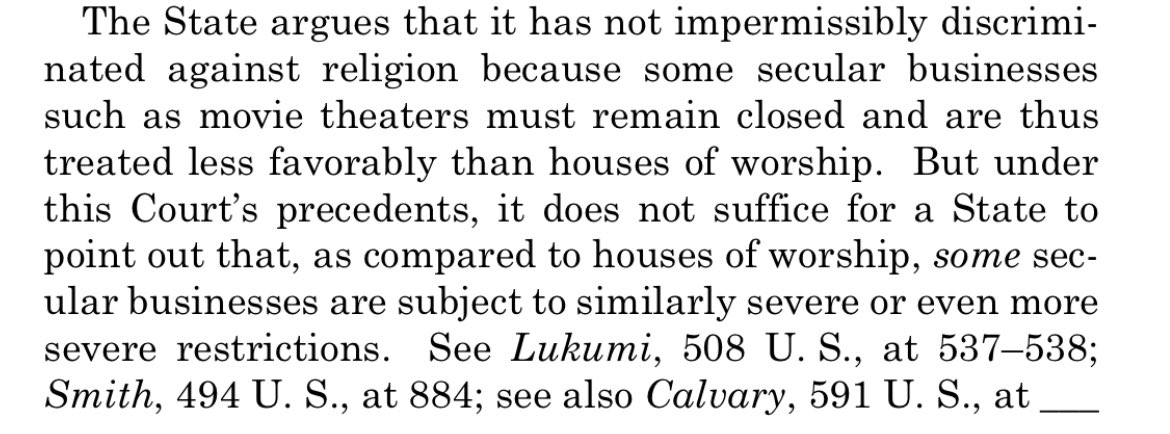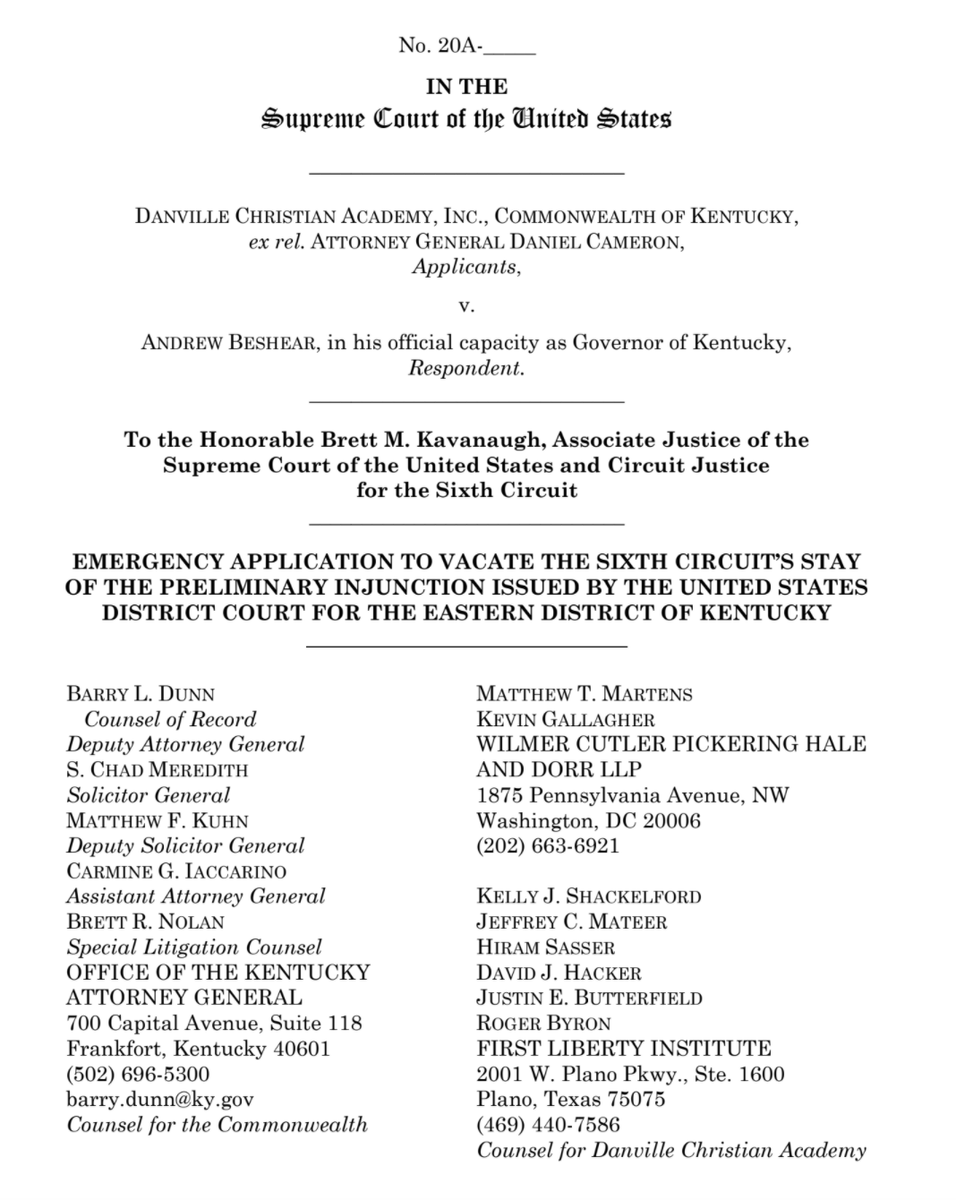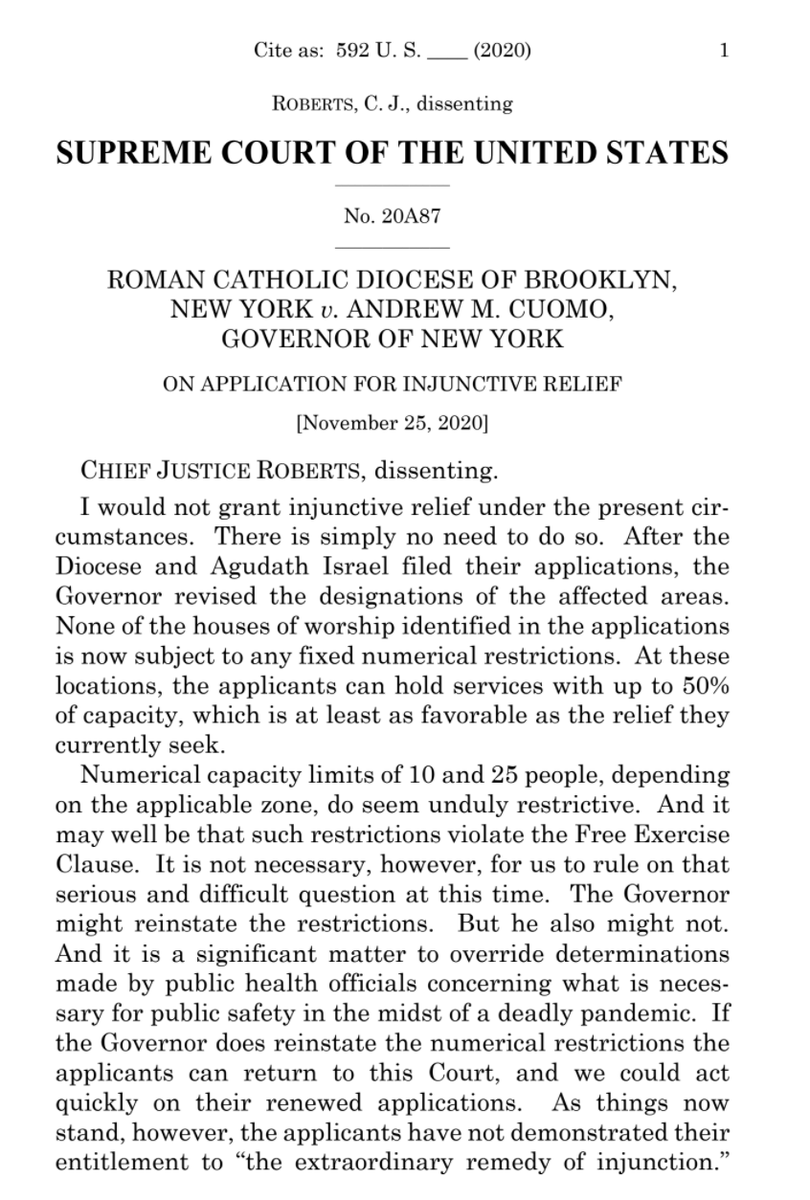
Jeff Wall begins arguing in Trump v. NY: "this case should be over" because the case is not ripe.
Wall: question is who counts as an "inhabitant". An immigrant stopped at the border, eg, cannot count.
CJ Roberts: is the Dec. 31st date still operative?
Wall: timing remains fluid; we are not on pace to send the census data by the deadline, but some of the data could be sent in January.
Wall: timing remains fluid; we are not on pace to send the census data by the deadline, but some of the data could be sent in January.
Roberts on standing: if Court doesn't intervene now, when would we be able to intervene?
Wall: post-apportionment lawsuit could go forward where the president could revise the memo
Roberts: isn't that like unscrambling the egg? more manageable to resolve now, no?
Wall: post-apportionment lawsuit could go forward where the president could revise the memo
Roberts: isn't that like unscrambling the egg? more manageable to resolve now, no?
Wall: there is a bit of an omelette to unscramble but we can get that done without too much trouble.
Roberts: are we talking about not all undoc. immigrants but just some possibly?
Wall: yes.
Roberts: are we talking about not all undoc. immigrants but just some possibly?
Wall: yes.
Thomas: is this something other than the census?
Wall: no, that's what the challengers are saying. Under the Franklin case (1992), president can send whatever numbers he wants to Congress for apportionment.
Wall: no, that's what the challengers are saying. Under the Franklin case (1992), president can send whatever numbers he wants to Congress for apportionment.
Thomas: what does Trump mean by "illegal alien"?
Wall: people who are present unlawfully.
Wall: people who are present unlawfully.
Breyer: if the Constitution prohibits POTUS from subtracting illegal aliens, he cannot ask the commerce secy for that information, right or wrong?
Wall: no problem with requesting the info....
Breyer getting exercised now: but it's not the info required!
Wall: no problem with requesting the info....
Breyer getting exercised now: but it's not the info required!
Breyer: they're suing the secretary, not the president. You cannot give him that information and say it's the number the law requires him to transmit.
Alito: posture of case is "quite frustrating" - it may be much ado about very little. How many are we talking about? Maybe just 60,000 being held in detention facilities — and those wouldn't change representation in Congress. Is it realistic to provide more info before 12/31?
Wall: very unlikely they'll be able to specify 10m or 12m undocumented immigrants before end of the year.
[Irony: this is in part because SCOTUS prevented Trump from adding the citizenship question in 2019.]
[Irony: this is in part because SCOTUS prevented Trump from adding the citizenship question in 2019.]
So far the gist of the conservative justices' questions has been: you don't really have time to feasibly find out how many undocumented immigrants there are in America before 12/31, do you??
Sotomayor: Trump's policy is that EVERY illegal alien should be excluded from the count, even if it's hard to figure out who they all are. The number *intended* to be excluded is large.
Wall: there's a real prospect the numbers will not affect apportionment, but we'd like the Court to reach the merits of the matter and say POTUS can do this.
Kagan: ICE detainees can be identified, but what about 200k people subject to final orders of removal? 700k DACA recipients?
Wall: we're working on those, but we don't know if president will want to exclude all of them.
Kagan: 3.2 non-detained people in removal proceedings?
Wall: we're working on those, but we don't know if president will want to exclude all of them.
Kagan: 3.2 non-detained people in removal proceedings?
Kagan: we can easily get to 4-5m people who can be identified before 12/31. Why the uncertainty??
Wall: we just don't know.
Wall: we just don't know.
Kagan: how would a post-apportionment challenge work? Seems the schedule is "very crunched", no?
Wall: nah.
Wall: nah.
Kagan: should we maybe just keep this around and not expedite the decision?
Wall: no, we need relief quickly so commerce secy can get that memo to the president.
Wall: no, we need relief quickly so commerce secy can get that memo to the president.
Wall is really itching to turn to the merits, but everybody wants to ask about threshold issues of standing, ripeness, feasibility of counting up the undocumented immigrants...
Kavanaugh: you say there's too much uncertainty for the case to be ripe, but if we order the president to redo his memo to Congress after the fact, he'll comply with that right?
Wall: yes
Wall: yes
Wall: we are taking data seriously and not using statistical sampling in identifying how many illegal aliens there are. it's painstaking .
Kav: so it's not possible to exclude all non-citizens, right?
Kav: so it's not possible to exclude all non-citizens, right?
Kav getting into the procedural weeds: is this standing? is it ripeness?
Wall: there's a lot of overlap, yeah.
Wall: there's a lot of overlap, yeah.
JUSTICE BARRETT FIRST TO GET TO THE MERITS!
Barrett: doesn't this violate long-standing norms that inhabitants are people who have been in the country for a long time and have a settled residence here?
Wall: that's not "allegiance or an enduring tie"
Wall: that's not "allegiance or an enduring tie"
Barrett: illegal aliens have never been excluded from the census before.
Wall: yes, that's the best argument on the other side. But long standing doesn't mean constitutionally compelled.
Wall: yes, that's the best argument on the other side. But long standing doesn't mean constitutionally compelled.
Barrett: it's been an unexercised discretion all along? presidents *could* have done what Trump wants to do for centuries and no one happens to have done so??
Wall: pretty much.
Wall: pretty much.
Wall wraps up: so many unknowns cast doubt on standing/ripeness BUT on the merits we win too since illegal aliens are not settled residents of the country.
Barbara Underwood has begun her time at the podium arguing against Trump's move to exclude illegal immigrants from the count.
Roberts: are you asking for a gag order for the secy of commerce?
Underwood: no gag order - he can be asked for and respond with all kinds of info. But not as a matter of what's required under the Census Act.
Underwood: no gag order - he can be asked for and respond with all kinds of info. But not as a matter of what's required under the Census Act.
Breyer asks about Franklin v. MA (1992), the case Trump cites for having discretion to send whatever apportionment he wants to Congress.
Alito just keeps right on talking when Roberts calls on Justice Sotomayor!
And he's still talking!
And traffic cop Roberts is just sitting in his car watching.
And traffic cop Roberts is just sitting in his car watching.
Finally onto Sotomayor: if commerce sec'y gives Trump illegal numbers, he cannot use them and cannot use other numbers to determine apportionment, right?
Underwood: right.
Underwood: right.
Kagan: back to standing. The government has tons of records on tons of people, but Wall says there's a matching problem (compare census answers to other data) that will hamper counting up all the illegal aliens. How important is this?
Underwood: I'm not sure how successful they'll be in getting them counted up, but "subtracting just some" of them would be enough to take away a seat in Congress from a state with many non-citizens.
Underwood: maybe wait a couple of weeks?
Gorsuch: so why isn't that a standing problem now, if we must rule now?
Underwood: they are working feverishly to count more than just ICE detainees...
Gorsuch: it's speculative to see how many they'll be able to do...and whether there's an effect on apportionment.
Underwood: they are working feverishly to count more than just ICE detainees...
Gorsuch: it's speculative to see how many they'll be able to do...and whether there's an effect on apportionment.
[Recall that on Wednesday night Gorsuch wrote that even though the churches & synagogues challenging Cuomo's covid restrictions are not now bound by the attendance limits, they may again in the future. But now he says the apportionment harm is speculative.🤨]
Barrett: if they can only identify certain categories (ICE detainees, people in removal proceedings, etc.), and different categories should be litigated separately, doesn't that cut in favor of waiting?
Underwood: no, speak to overall policy now
Underwood: no, speak to overall policy now
Underwood wraps up on the merits: framers wanted a system that would not be easily manipulated; immigrants are "not invisible" and they need representatives to give them that attention. These people have family and community ties.
Now onto Dale Ho, the ACLU attorney arguing for the immigrant-rights organizations against Trump's plan.
He successfully argued the citizenship-question case before SCOTUS in 2019.
He successfully argued the citizenship-question case before SCOTUS in 2019.
Roberts: what's the problem with post-apportionment litigation? Why not wait?
Ho: waiting a couple of weeks wouldn't be too disruptive, but longer than that would deprive nation of prompt notice of apportionment
Ho: waiting a couple of weeks wouldn't be too disruptive, but longer than that would deprive nation of prompt notice of apportionment
Thomas: hard to assess what info will be available, so why not wait a few weeks?
Ho: Trump says the entire category should be excluded, so we have a facial challenge. It's unlawful.
Ho: Trump says the entire category should be excluded, so we have a facial challenge. It's unlawful.
Breyer: what about the lawfulness of excluding just ICE detainees?
Ho: Quite mixed bag of people at ICE - some can apply for asylum or reside in the country for a very long time - some are not deported after all....
Ho: Quite mixed bag of people at ICE - some can apply for asylum or reside in the country for a very long time - some are not deported after all....
Ho: "usual residence" is the standard, not lawful immigration status.
He's exceptionally clear here.
He's exceptionally clear here.
Ho: there is discretion to make decisions on the basis of residence, but not on lawful immigration status.
Kagan: any insight into how feasible it is for the govt to count up these non-citizens?
Ho: Trump in July 2019 ordered administrative record-keeping good enough to identify 90% of the non-citizen population.
Ho: Trump in July 2019 ordered administrative record-keeping good enough to identify 90% of the non-citizen population.
Kavanaugh with long preface to simple q: how feasible?
Ho: each group is overbroad and excluding any of them would be illegal
Ho: each group is overbroad and excluding any of them would be illegal
Ho: SCOTUS should rule on the legality of this broadly sweeping policy.
Barrett: would it be ok for Trump to issue another memorandum that excludes a smaller subgroup of illegal immigrants?
Ho: it would be an entirely new policy with new scope and the injunction in this case wouldn't govern it.
Ho: it would be an entirely new policy with new scope and the injunction in this case wouldn't govern it.
Ho closing: no court, no Congress has thought it OK to exclude non-citizens. it's based on total population, period.
Also: 80% are essential workers, they contribute to our economy, they are our neighbors, our co-workers and our family members.
Also: 80% are essential workers, they contribute to our economy, they are our neighbors, our co-workers and our family members.
Wall rebuttal: case is not ripe! also, on merits, if president can exclude *some* sub-categories of illegal immigrants, SCOTUS should let POTUS act on this policy.
Oral argument gavelled to a close.
Seems a majority of the Court thinks this thing isn't ripe.
Seems a majority of the Court thinks this thing isn't ripe.
• • •
Missing some Tweet in this thread? You can try to
force a refresh












